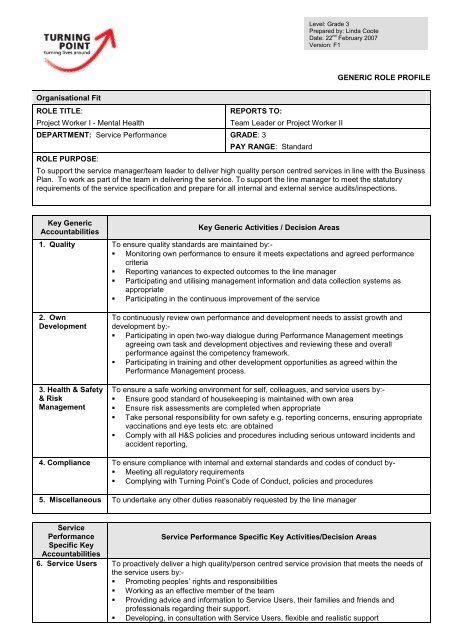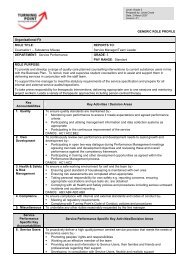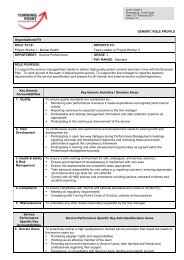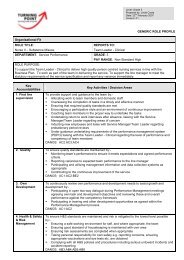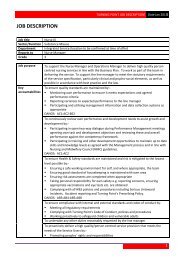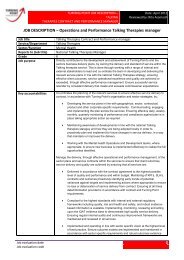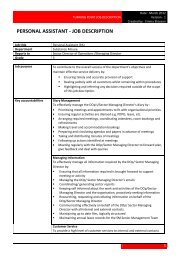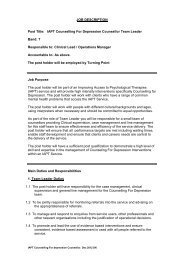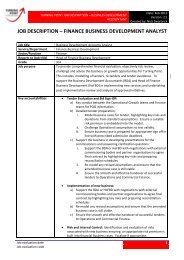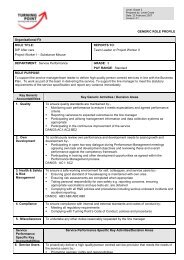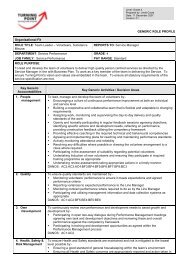Role Profile Blank Template.doc
Role Profile Blank Template.doc
Role Profile Blank Template.doc
You also want an ePaper? Increase the reach of your titles
YUMPU automatically turns print PDFs into web optimized ePapers that Google loves.
Level: Grade 3<br />
Prepared by: Linda Coote<br />
Date: 22 nd February 2007<br />
Version: F1<br />
Organisational Fit<br />
ROLE TITLE:<br />
Project Worker I - Mental Health<br />
REPORTS TO:<br />
DEPARTMENT: Service Performance GRADE: 3<br />
ROLE PURPOSE:<br />
Team Leader or Project Worker II<br />
PAY RANGE: Standard<br />
GENERIC ROLE PROFILE<br />
To support the service manager/team leader to deliver high quality person centred services in line with the Business<br />
Plan. To work as part of the team in delivering the service. To support the line manager to meet the statutory<br />
requirements of the service specification and prepare for all internal and external service audits/inspections.<br />
Key Generic<br />
Accountabilities<br />
Key Generic Activities / Decision Areas<br />
1. Quality To ensure quality standards are maintained by:-<br />
• Monitoring own performance to ensure it meets expectations and agreed performance<br />
criteria<br />
• Reporting variances to expected outcomes to the line manager<br />
• Participating and utilising management information and data collection systems as<br />
appropriate<br />
• Participating in the continuous improvement of the service<br />
2. Own<br />
Development<br />
3. Health & Safety<br />
& Risk<br />
Management<br />
To continuously review own performance and development needs to assist growth and<br />
development by:-<br />
• Participating in open two-way dialogue during Performance Management meetings<br />
agreeing own task and development objectives and reviewing these and overall<br />
performance against the competency framework.<br />
• Participating in training and other development opportunities as agreed within the<br />
Performance Management process.<br />
To ensure a safe working environment for self, colleagues, and service users by:-<br />
• Ensure good standard of housekeeping is maintained with own area<br />
• Ensure risk assessments are completed when appropriate<br />
• Take personal responsibility for own safety e.g. reporting concerns, ensuring appropriate<br />
vaccinations and eye tests etc. are obtained<br />
• Comply with all H&S policies and procedures including serious untoward incidents and<br />
accident reporting,<br />
4. Compliance To ensure compliance with internal and external standards and codes of conduct by-<br />
• Meeting all regulatory requirements<br />
• Complying with Turning Point’s Code of Conduct, policies and procedures<br />
5. Miscellaneous To undertake any other duties reasonably requested by the line manager<br />
Service<br />
Performance<br />
Service Performance Specific Key Activities/Decision Areas<br />
Specific Key<br />
Accountabilities<br />
6. Service Users To proactively deliver a high quality/person centred service provision that meets the needs of<br />
the service users by:-<br />
• Promoting peoples’ rights and responsibilities<br />
• Working as an effective member of the team<br />
• Providing advice and information to Service Users, their families and friends and<br />
professionals regarding their support.<br />
• Developing, in consultation with Service Users, flexible and realistic support
packages/person centred plans within agreed guidelines or service models<br />
• Ensuring that a collaborative approach is used, with effective communication links with<br />
external professional groups e.g. GPs, Social Services, etc. and to work as an effective<br />
member of any multi-disciplinary team<br />
• In residential services, ensure services users take their prescribed medication on time<br />
assisting them where necessary<br />
• In residential services, ensure services users take their prescribed medication on time<br />
assisting them where necessary<br />
• Providing written reports to professionals and other organisations, such as, GPs,<br />
probation services, social care services, Court reports etc.<br />
• Ensuring record keeping is maintained to the required standard at all times and<br />
contributing to service monitoring requirements<br />
• Undertaking responsibility for clinical risk and needs assessment and the formation and<br />
implementation of management plans<br />
• Agreeing and formulating individual action/care plans<br />
7. Service To assist the Service Manager/Team Leader in the implementation, development and<br />
delivery of the service by:-.<br />
• Assisting in the development and implementation of Service record keeping, procedures<br />
and policies<br />
• Attending relevant internal and external meetings as requested including multi-agency<br />
meetings and Statutory Sector Services.<br />
• Ensuring that all joint working Policies and Procedures are adhered to where the Service<br />
is run on a partnership basis<br />
8. Service<br />
Development<br />
To work collaboratively to develop the service by:-<br />
• Developing and co-ordinating professional links with other statutory and voluntary service<br />
providers, ensuring a corporate approach is adopted.<br />
• Assisting in establishing formal communication / support / education structures for<br />
statutory and voluntary service providers throughout the Local area.<br />
• Ensuring the service and the wider organisation of Turning Point is represented in a<br />
professional manner at all times.<br />
• Proactively contributing to continuously improving the service by making positive<br />
suggestions, providing constructive feedback and assisting in the implementation of<br />
agreed new ways of working.<br />
• Ensuring day to day delivery of service provision embeds and extends Turning Point’s<br />
person centred approach.<br />
• Meeting agreed performance targets and outcomes<br />
Mental Health<br />
Specific Key<br />
Accountabilities<br />
9. Empathy,<br />
Support &<br />
Encouragement<br />
of service users<br />
10. Sector Quality<br />
Standards<br />
Mental Health Specific Key Activities / Decision Areas<br />
Using a recovery and outcome focussed approach to meet identified needs by:<br />
• Working with service users to develop comprehensive plans, monitoring and reviewing<br />
progress against these<br />
• Enabling service users, through education and raising awareness, to manage factors that<br />
affect their mental wellbeing including substance misuse<br />
• Ensuring effective care pathways are provided to each service user<br />
• Developing, implementing, and reviewing service user focussed interventions<br />
• Recognising indicators of deteriorating mental health and substance misuse, acting<br />
appropriately and liaising with the relevant agencies<br />
• Providing guidance to service users and families of current legislation such as the New<br />
Horizons and the Mental Health Act<br />
• Providing information and raise awareness about substances, their use and effects<br />
To ensure all services are delivered in accordance with recognised standards by: -<br />
• Ensuring all services are delivered within CQC and Supporting People requirements as<br />
appropriate<br />
Other Duties
<strong>Role</strong> Dimensions<br />
Financial (limits/mandates etc.)<br />
• Responsible for managing petty cash and daily<br />
expenditure<br />
Non-financial (customers/staff etc)<br />
Case load dependent upon service<br />
Main Contacts (external and internal)<br />
Contact group<br />
• Service Users<br />
• Service Manager/Team Leader<br />
• Team Members<br />
• Carers/Friends/Family members<br />
• Partner agencies in local area<br />
• Regulatory bodies<br />
• Regional Manager and TP<br />
Central Support services<br />
• Local community members<br />
• Advocacy /Service User forums<br />
Frequency<br />
• Daily<br />
• Daily<br />
• Daily<br />
• As required<br />
• As required<br />
• As required<br />
• As required<br />
• As required<br />
• As required<br />
Purpose<br />
• Provide support and guidance. Ensure<br />
service delivery effectiveness and user<br />
involvement/consultation<br />
• Guidance, support, advice and provision of<br />
information<br />
• To deliver service and provide reciprocal<br />
support/guidance and management as<br />
required<br />
• Provide support and guidance. Service<br />
user reviews, finances and health<br />
• Communications, service delivery and<br />
health and social support to service users<br />
• Service monitoring and review<br />
• Corporate issues, national guidance,<br />
ensuring continuity of high quality service.<br />
• Community issues<br />
• Discuss ethical issues regarding service<br />
users<br />
Person Specification (Essential only)<br />
Technical / Professional Skills, Expertise and Qualifications<br />
• Proven verbal and written communication skills with the ability to tailor the message to the audience<br />
• Collaborative team working skills<br />
• Experience in supervising a small team where appropriate to the role<br />
• Able to deliver a range of services/treatments/interventions in a person centred, non-judgemental manner.<br />
• Able to demonstrate flexibility and creativity when developing support packages<br />
• Experience in managing a caseload of service users with complex needs<br />
• Adaptable and able to work in a challenging and changeable environment<br />
• Proven track record in managing incidents of verbal and violent aggression<br />
• Able to demonstrate a good knowledge and value base in a relevant service specialism.<br />
• Ability to deliver against agreed objectives and targets<br />
• Experience of working with vulnerable young people with complex needs<br />
• Understanding of the issues surrounding homelessness<br />
• Understanding of housing support and welfare benefits<br />
Additional Service user Sector Specific Requirements (Essential only)<br />
Technical / Professional Skills, Expertise and Qualifications<br />
• Proven track record of working with complex needs<br />
• Demonstrable education and/or training in social care including Mental Health, Substance Misuse and Complex<br />
Needs<br />
• Working knowledge and understanding of mental health issues and the ability to recognise the indicators of<br />
deteriorating mental health<br />
• Understanding of the issues faced by service users with mental health and/or dual diagnosis challenges<br />
• Awareness of associated issues faced by service users with a mental health problem and/or dual diagnosis<br />
• Working knowledge and understanding of current legislation, such as New Horizons and the Mental Health Act<br />
• Vocational qualification e.g. NVQ 3 or equivalent or willingness to work towards
PROGRESSION IN ROLE<br />
PROJECT WORKER I – MENTAL HEALTH<br />
What does this role look like when done at varying levels of competency?<br />
COMPETENCY INEFFECTIVE PROFICIENT ADVANCED<br />
• Often generates customer complaints • Is proactive and reliable<br />
• Work on a daily basis consistently exceeds<br />
Commitment to<br />
Customer Service<br />
• Does not comply with organisational<br />
policies, procedures or legal requirements<br />
• Delivers high quality person centred<br />
services<br />
expectations and quality standards,<br />
bosses and peers alike recognise the<br />
Provides a quality, • Makes promises that cannot be delivered • Takes personal accountability for own<br />
employee as someone who ‘goes the extra<br />
inclusive customerfocussed<br />
• Is unresponsive, unhelpful and inflexible with responsibilities<br />
mile’<br />
service customers<br />
• Takes corrective action when necessary, • Spontaneous feedback is often received<br />
• Covers up mistakes<br />
sharing learning with others<br />
from service users, other agencies and<br />
The Project Worker’s • Allows unsafe working environments to go • Proactively collects feedback from service peers and is consistently positive<br />
aim is to achieve<br />
unreported<br />
users or others as appropriate<br />
• Shares their expertise supportively with<br />
personal customerfocused<br />
excellence<br />
received<br />
customer focus.<br />
• Fails to treat people with dignity and respect • Is open to, and acts positively on feedback colleagues to improve the overall service’s<br />
and to encourage<br />
• Maintains a safe working environment • Anticipates and acts to resolve issues as<br />
this in colleagues<br />
appropriate that may result in poor quality<br />
and service standards<br />
• Actively develops innovative person<br />
centred approaches<br />
Delivering Positive<br />
Outcomes<br />
Working towards and<br />
achieving agreed<br />
outcomes<br />
The Project Worker’s<br />
aim is to deliver<br />
agreed outcomes<br />
• Wastes resources<br />
• Takes decisions without considering the<br />
consequences<br />
• Does not consult appropriately or keep<br />
others informed<br />
• Consistently fails to meet agreed objectives<br />
• Takes inappropriate risks<br />
• Endangers the health & safety of self and/or<br />
others<br />
• Does not cooperate in achieving own or<br />
others’ objectives and/or outcomes.<br />
• Does not participate actively in the PDPO<br />
system<br />
• Uses resources efficiently/effectively<br />
• Always completes care/support plans for<br />
each service user to required standards<br />
• Takes a positive approach to achieving the<br />
agreed outcomes for each service user.<br />
• Effectively contributes to service targets<br />
• Proactively manages risks, identifies<br />
obstacles and asks for help when necessary<br />
• Completes own tasks within the agreed<br />
time, budget, and standards<br />
• Ensures that work is always completed in a<br />
thorough manner<br />
• Maintains, monitors and evaluates reporting<br />
systems<br />
• Maintains all service user records to the<br />
• Feedback from service users and others<br />
consistently states that the employee has<br />
encouraged the service user to exceed<br />
their own expectations in turning their lives<br />
around.<br />
• Regularly achieves more than agreed<br />
either through own objectives, expected<br />
outcomes or accepted quality standards<br />
• Stays motivated and energised under<br />
pressure and is resilient when faced with<br />
set backs<br />
• When discussing problems/issues has<br />
suggestions for a solution<br />
• Regularly volunteers to help out team<br />
mates to achieve their outcomes whilst still
equired standard and in a logical and<br />
ordered manner<br />
• Actively participates in PDPO system, is<br />
open and honest in discussions and<br />
receives and acts upon feedback<br />
achieving their own<br />
• Is instrumental in ensuring that the Service<br />
is known for consistently delivering the<br />
highest standards.<br />
• Provides a consistently high quality person<br />
centred service with Service Users with<br />
whom other peers fail to support as<br />
effectively.<br />
• Reflects on, and displays self knowledge<br />
about, own performance<br />
Showing Personal<br />
Leadership<br />
Taking personal<br />
responsibility and<br />
displaying integrity<br />
and professionalism<br />
at all times<br />
The Project Worker’s<br />
aim is to effectively<br />
manage self in a<br />
professional manner<br />
and act with integrity<br />
at all times<br />
• Bad mouths Turning Point<br />
• Does not lead by example<br />
• Takes credit for others’ work or ideas<br />
• Does not keep up to date with development<br />
in own professional area<br />
• Blames others for own mistakes<br />
• Does not deal with conflicts appropriately<br />
• Fails to keep things in perspective; causes<br />
anxiety and stress for others<br />
• Understands Turning Point’s vision and<br />
values and acts in support of these aims<br />
• Acts in a fair and unbiased manner with all,<br />
acknowledging and appreciating differences<br />
of all kinds<br />
• Helps new or inexperienced workers settle<br />
into the service by inducting, coaching and<br />
supporting them.<br />
• Works cooperatively, is helpful and<br />
adaptable.<br />
• Is sensitive to the impact of own actions on<br />
others choosing appropriate style and<br />
language.<br />
• Consistently motivates/challenges/ supports<br />
others in the pursuit of agreed outcomes<br />
• Contributes to a stable and effective team<br />
working environment<br />
• Takes advantage of opportunities to learn<br />
and develop by all appropriate means (i.e.<br />
not just attending training courses when<br />
required to)<br />
• Projects a positive image of Turning Point<br />
externally never attracting negative<br />
feedback on behaviour<br />
• Consistently works in accordance with<br />
Turning Point values on a daily basis and<br />
challenges others if and when negative<br />
behaviours are displayed<br />
• Keeps calm in a crisis and keeps emotions<br />
in check when under stress or in difficult<br />
situations<br />
• Is keen to gain new knowledge and<br />
expertise and actively seeks the<br />
opportunity to do so<br />
• Helps others to learn and develop by<br />
voluntarily sharing knowledge, showing<br />
people how to do things and giving<br />
colleagues support when trying out things<br />
that are new to them.<br />
• Effectively communicates key<br />
organisational messages actively<br />
supporting the wider aims of Turning Point<br />
as an organisation<br />
Effective<br />
Communication<br />
• Fails to communicate effectively<br />
• Interrupts and/or over-talks others<br />
• Is rude and insensitive<br />
• Writes ungrammatical and/or illogical<br />
• Reports, letters and/or emails are written in<br />
clear and concise language avoiding<br />
unnecessary jargon<br />
• Displays active listening and questioning<br />
• Demonstrates the effective use of a range<br />
of communications tools and techniques<br />
• Point of view is always based on reason<br />
and logic and quality conversations with
Listening and<br />
communicating<br />
clearly and openly<br />
The Project Worker’s<br />
aim is to utilise<br />
effective<br />
interpersonal<br />
communication skills<br />
communications<br />
• Uses aggressive or inappropriate body<br />
language<br />
• Uses jargon inappropriately<br />
• Communicates inaccurately through lack of<br />
preparation<br />
skills when communicating verbally to<br />
ensure understanding (misunderstandings<br />
are rare events)<br />
• Always chooses appropriate style of<br />
communication for the audience/recipient(s)<br />
and communicates the right information to<br />
the right people at the right time.<br />
• Maintains confidentiality and security of<br />
service users’ and/or others’ personal<br />
information<br />
• Represents the organisation, service users<br />
and peers effectively in meetings<br />
others come naturally<br />
• Is seen to initiate the conversation with<br />
others especially in difficult situations and<br />
approaches these with tact.<br />
Building<br />
Relationships<br />
Works collaboratively<br />
internally and<br />
externally with others<br />
to achieve Turning<br />
Point’s vision<br />
The Project Worker’s<br />
aim is to build<br />
effective and robust<br />
relationships with<br />
colleagues and<br />
customers<br />
Innovation &<br />
Change<br />
Delivering service<br />
improvement through<br />
innovation and<br />
change<br />
The Project Worker’s<br />
aim is to solve<br />
problems and<br />
positively embrace<br />
change at a personal<br />
• Puts own agenda before others<br />
• Avoids involving others<br />
• Displays unethical behaviour<br />
• Commits beyond own remit<br />
• Is inflexible and unable to adapt personal<br />
style<br />
• Does not recognise appropriate boundaries;<br />
oversteps the mark<br />
• Unwilling to see things from others’<br />
perspectives<br />
• Always finds a reason for not doing<br />
something new<br />
• Is resistant to new ideas<br />
• Says ‘we’ve always done it this way’<br />
• Creates barriers to prevent or slow<br />
change<br />
• Creates and maintains effective external<br />
relationships that assist the expansion of the<br />
service<br />
• Builds productive and cooperative working<br />
relationships with colleagues demonstrating<br />
a willingness to compromise for the overall<br />
good of the service<br />
• Always maintains appropriate professional<br />
work-focussed relationships at all times<br />
• Respects individual differences and<br />
contribution acknowledging and appreciating<br />
same<br />
• Displays an open minded approach, listens<br />
to others and seeks solutions to problems<br />
• Shows a positive approach to change,<br />
willingly adopting new approaches to<br />
existing tasks<br />
• Keenly responds to implementing person<br />
centred service approach<br />
• Actively suggests new ways of working that<br />
improves existing processes<br />
• Actively contributes ideas and suggestions<br />
• Anticipates changing needs of service users,<br />
communicating and planning accordingly<br />
• Voluntarily gets on with their fair share of<br />
unpopular tasks<br />
• Takes the wider team issues into account<br />
when doing their job<br />
• Works effectively across role boundaries<br />
• Works on personal differences between<br />
colleagues to minimise the impact of these<br />
at work<br />
• Willingly offers and provides support and<br />
assistance to colleagues<br />
• Shows enthusiasm for new<br />
experiences<br />
• Develops new ways of involving<br />
service users in provision of high<br />
quality and innovative services<br />
• Identifies new opportunities for<br />
improvement for service development<br />
and seeks ways to develop them<br />
• Motivates colleagues to find solutions<br />
to problems and challenges<br />
• Actively supports Service<br />
Manager/Team Leader in ensuring that<br />
improvement in service delivery is an
level<br />
ongoing process<br />
• Takes a proactive role in developing<br />
new services with the support of a<br />
service manager<br />
•<br />
Developing &<br />
Applying job<br />
knowledge and<br />
skills<br />
Contributing to the<br />
provision of social<br />
care by developing,<br />
maintaining and<br />
applying own job<br />
knowledge and skills<br />
• Does not meet minimum knowledge and skill<br />
requirements<br />
• Avoids sharing knowledge and skills<br />
• Does not complete required learning and<br />
development activities<br />
• Discourages new thinking or ways of<br />
working<br />
• Fails to apply knowledge and skills in<br />
practice<br />
• Maintains and develops own areas of<br />
professional skill<br />
• Applies appropriate theories and knowledge<br />
in a practical manner<br />
• Complies with all regulatory, statutory or<br />
internal knowledge and skill requirements<br />
• Shares knowledge in areas of service<br />
delivery in which they have demonstrable<br />
expertise<br />
• Develops knowledge and skill beyond the<br />
immediate requirements of their job<br />
• Active member of relevant professional<br />
body<br />
• Voluntarily coaches others to help their<br />
development across a broad range of skills<br />
• Provides training in areas of own expertise<br />
The Project Worker’s<br />
aim is to develop and<br />
apply job knowledge<br />
and skills to own<br />
role, coaching others<br />
as appropriate<br />
Business and<br />
Financial Acumen<br />
Managing and<br />
growing the business<br />
The Project Worker’s<br />
aim is to operate<br />
within budgets and<br />
financial parameters<br />
• Shows poor financial management & control<br />
• Wastes resources<br />
• Provides inaccurate or misleading financial<br />
information<br />
• Makes unauthorised decisions regarding<br />
finances<br />
• Feeds information into the budgetary cycle<br />
• Shows awareness of financial impact of<br />
decisions and/or actions<br />
• Recycles waste effectively<br />
• Maintains accurate financial records<br />
• Ensures expenditure is authorised by line<br />
manager and appropriate procedures are<br />
followed<br />
• Displays an understanding of the<br />
importance of financial planning and<br />
monitoring<br />
• Identifies and communicates costs savings<br />
• When supervising others, makes the best<br />
use of resources
Applying<br />
Management<br />
Information<br />
Managing and<br />
interpreting business<br />
and operational<br />
information<br />
The Project Worker’s<br />
aim is to enter data<br />
and collage<br />
management<br />
information<br />
• Sends out inaccurate and/or out of date<br />
information<br />
• Produces misleading information<br />
• Produces unnecessarily complex information<br />
• Withholds information or provides too much<br />
• Breaks confidentiality<br />
• Is computer literate and uses a broad range<br />
of packages<br />
• Checks data for accuracy and inputs<br />
carefully into systems/records maintaining<br />
up to date files<br />
• Ensures gaps in data/information are filled<br />
and input to systems and/or records.<br />
• Appropriately shares information in line with<br />
internal and external guidelines<br />
• Effectively implements information<br />
management policies and procedures with<br />
minimal support line manager<br />
• Identifies new ways of using existing data<br />
systems to manage information more<br />
effectively<br />
• Uses technology to improve the efficiency<br />
of data collection and analysis


